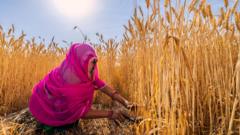As early summer temperatures engulf India, farmers and manufacturers brace for challenges ahead due to climate irregularities. For 50 years, Nitin Goel has operated a clothing business in Ludhiana, but with shorter winters, he's forced to shift production from sweaters to t-shirts, resulting in a 10% sales drop this season. Data reveals last month was the hottest February in 125 years, prompting worries in both agriculture and manufacturing sectors.
In Devgad, farmer Vidyadhar Joshi reports an alarming reduction in Alphonso mango production to just 30% of normal yields, forcing him to invest more in irrigation. Experts link heatwaves to decreased agricultural outputs, with predictions indicating that 2023 could echo the yield losses experienced in 2022. India's agriculture minister remains optimistic, but independent analysts fear the country may face wheat import reliance amid declining working hours due to heat stress.
The situation is compounded by dwindling reservoir levels, which have dropped to 28% capacity. The agricultural landscape in India, home to 75% of extreme event hotspots, faces a serious threat from ongoing climate challenges. To combat these crises, improved weather forecasting and adaptive agricultural practices are essential. Without decisive actions, India risks enduring economic instability tied to climate change effects, including potential food inflation and overall growth setbacks.






















